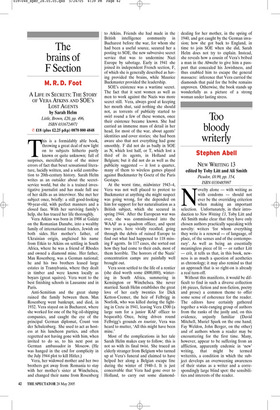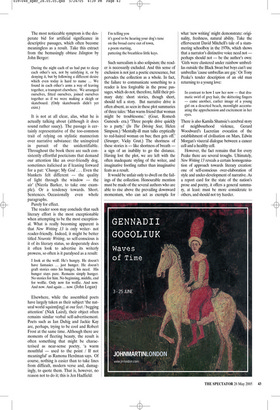Too bloody writerly
Stephen Abell
NEW WRITING 13 edited by Toby Litt and Ali Smith Picador, £8.99, pp. 354, ISBN 0330485997 Novelty alone — with writing as with condoms — should not ever be the overriding criterion when making an important selection. Unfortunately, in their introduction to New Writing 13, Toby Litt and Ali Smith make clear that they have only chosen authors practically squeaking with novelty: writers ‘for whom everything they write is a renewal — of language, of place, of the senses and of the contemporary’. As well as being an essentially meaningless piece of lit — or rather Litt — crit, it tells us that, in this book, newness is as much a question of aesthetics as chronology; it may also remind us that an approach that is so right-on is already a real turn-off.
Without this manifesto, it would be difficult to find in such a diverse collection (46 pieces, fiction and non-fiction, poetry and prose) a common theme to offer some sense of coherence for the reader. The editors have certainly gathered together a wide-ranging group of authors from the ranks of the justly and, on this evidence, unjustly familiar (David Mitchell, Muriel Spark on the one hand; Fay Weldon, John Berger, on the other) and of authors whom a reader may be encountering for the first time. Many, however, appear to be suffering from an affliction, apparently endemic in ‘new’ writing, that might be termed writeritis, a condition in which the subject develops an overweening awareness of their status as a writer and a correspondingly large blind spot: the sensibilities and interests of the reader. The most noticeable symptom is the desperate bid for artificial significance in descriptive passages, which often become meaningless as a result. Take this extract from the bemusingly obtuse Islington by John Berger:
During the night each of us had put to sleep each other’s sex, not by satisfying it, or by denying it, but by following a different desire which even today is hard to name ... We found in each other’s arms a way of leaving together, a transport elsewhere. We arranged ourselves, fitted ourselves, joined ourselves together as if we were making a sleigh or skateboard. (Only skateboards didn’t yet exist.)
It is not at all clear, alas, what he is actually talking about (although it does sound rather saucy). The passage is certainly representative of the too-common trait of relying on stylistic mannerism over narrative substance: the uninspired in pursuit of the unidentifiable. Throughout the book there are such consistently effortful poeticisms that demand our attention like an over-friendly dog, sometimes italicised as if leaning forward for a pat: ‘Change; My God ... Even the blankets felt different — the quality of light through the window — the air’ (Nicola Barker, to take one example). Or a tendency towards. Short. Sentences. Occasionally even whole paragraphs.
Purely for effect.
The reader soon may conclude that such literary effort is the most exceptionable when attempting to be the most exceptional. What is really becoming apparent is that New Writing 13 is only writernot reader-friendly. Indeed, it might be better titled Neurotic Writing, so self-conscious is it of its literary status, so desperately does it often look to advertise its writerly prowess, so often is it paralysed as a result: I look at the wolf. He’s hungry. He doesn’t have fantasies ... just hunger. He doesn’t graft stories onto his hunger, his need. His hunger stays pure. Remains simply hunger. No stories for him. No beginning, middle, end for wolfie. Only now for wolfie. And now. And now. And again ... now. (John Logan) Elsewhere, while the assembled poets have largely taken as their subject ‘the natural world squirm[ing] at our feet / begging attention’ (Nick Laird), their object often remains similar verbal self-advertisement. Poets such as Ian Duhig and Jackie Kay are, perhaps, trying to be cool and Robert Frost at the same time. Although there are moments of fleeting beauty, the result is often something that might be characterised as near-sense poetry, ‘a warm mouthful — used to the point / If not meaningful’ as Ramona Herdman says. Of course, nothing is easier than to take lines from difficult, modern verse and, damagingly, to quote them. That is, however, no reason not to do it; this is Jen Hadfield:
I’m telling you it’s good to be hearing your dog’s tune on the broad curve out of town, a poem starting, pattering the breathless little keys.
Such surrealism is also solipsism; the reader is necessarily excluded. And this sense of exclusion is not just a poetic excrescence, but pervades the collection as a whole. In fact, the failure to communicate something to a reader is less forgivable in the prose passages, which do not, therefore, fulfil their primary duty: short stories, though short, should tell a story. But narrative drive is often absent, as seen in these plot summaries of three tales: ‘Man warns friend that woman might be troublesome.’ (Goat, Romesh Gunesekera.) ‘Three people drive quickly to a party.’ (In The Driving Seat, Helen Simpson.) ‘Mentally-ill man talks cryptically to red-haired woman on bus; then gets off.’ (Stranger, Vicky Grut.) The shortness of these stories is — like shortness of breath a sign of an inability to go the distance. Having lost the plot, we are left with the often inadequate styling of the writer, and imaginative footling rather than imaginative feats as a result.
It would be unfair only to dwell on the failings of the collection. Honourable mention must be made of the several authors who are able to rise above the prevailing downward momentum, who can act as exempla for what ‘new writing’ might demonstrate: originality, freshness, natural ability. Take the effervescent David Mitchell’s tale of a stammering schoolboy in the 1970s, which shows that a narrator’s distinctive voice need not perhaps should not — be the author’s own: ‘Girls were clustered under rainbow umbrellas outside the Black Swan but boys can’t use umbrellas ’cause umbrellas are gay.’ Or Tony Peake’s tender description of an old man returning to a young love:
In contrast to how I saw her now — that dramatic swirl of grey hair, the skittering fingers — came another, earlier image of a young girl on a deserted beach, moonlight accentuating the apprehension and excitement in her eyes.
There is also Kamila Shamsie’s cerebral story of neighbourhood violence, Gerard Woodward’s Lucretian evocation of the establishment of civilisation on Mars, Edwin Morgan’s visceral dialogue between a cancer cell and a healthy cell.
However, the fact remains that for every Peake there are several troughs. Ultimately, New Writing 13 reveals a certain homogenisation of approach towards literary creation: one of self-conscious over-elaboration of style and under-development of narrative. As a report card for the state of the nation’s prose and poetry, it offers a general summary, at least: must be more considerate to others, and should not try harder.























































 Previous page
Previous page